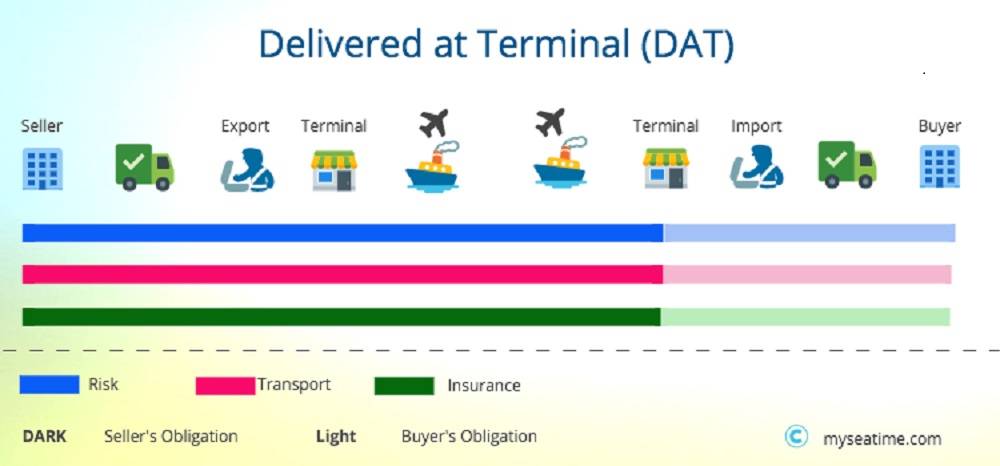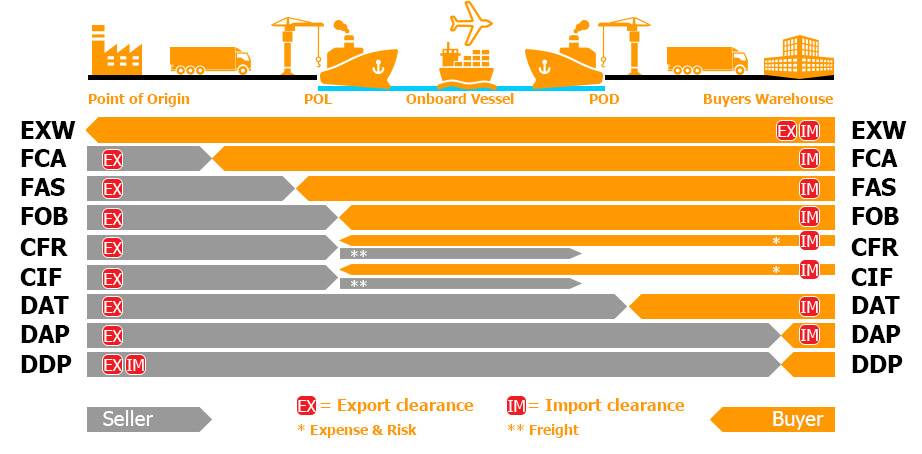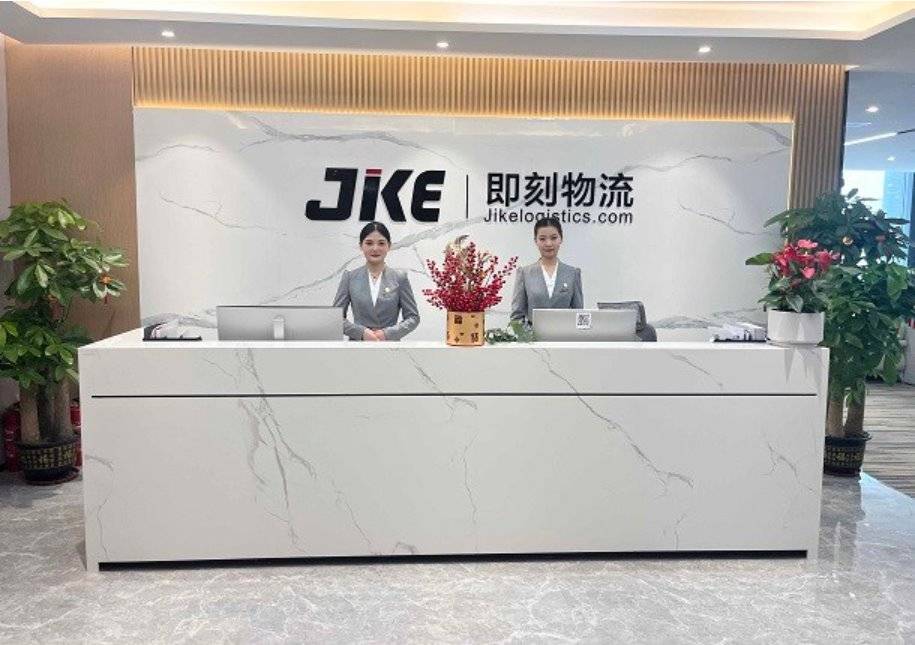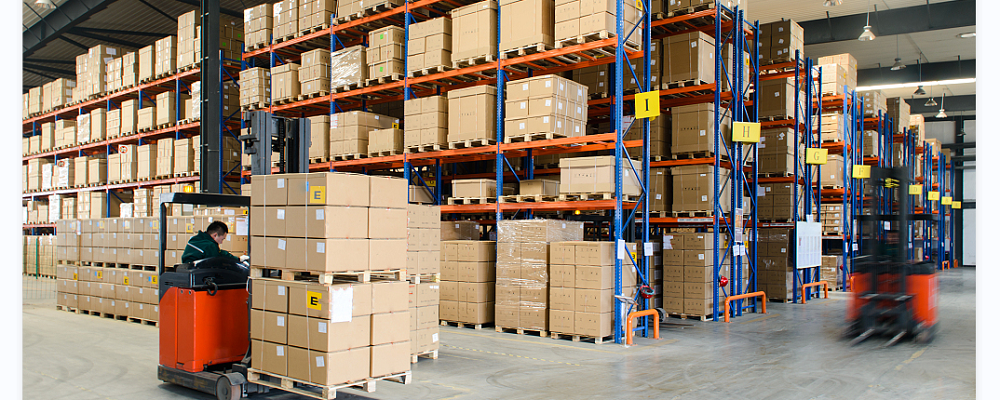2024-12-20
Understanding and correctly using various trade terms in international trade is crucial. These terms help buyers and sellers clarify their respective responsibilities and obligations, thereby ensuring the smooth progress of transactions. As one of the international trade terms, DAT incoterm plays a key role in specific transportation scenarios. This article will detail the definition of DAT, its scope of application, the allocation of responsibilities between buyers and sellers, and the precautions in actual operation.
| Shipping Services from/to China |
DAT is the abbreviation of "Delivered at Terminal." According to DAT terminology, the seller must deliver the goods to the terminal designated by the buyer and bear all costs and risks until the goods are unloaded at the terminal.
This means that the seller is responsible for not only the transportation but also the unloading of the goods until they are entirely removed from the means of transport and placed on the ground at the terminal. The advantage of DAT terms is that they provide a precise mechanism for the delivery and risk transfer of goods to both the buyer and the seller.

To better understand the DAT term, we can compare it to other standard trade terms:

International sea transport In sea freight, the DAT clause is often used to describe the situation where the seller transports the containerized goods to the container yard of the designated port and hands them over to the buyer or its agent. This method helps to simplify port operations and improve logistics efficiency.
International rail transport In cross-border railway transportation, the DAT clause can describe the seller's delivery of the goods to the railway freight station of the designated country to complete the delivery. This method helps to achieve fast and convenient transportation of cross-border goods.
International road transport DAT terms also apply to international road transport. To complete the delivery, the seller can deliver the goods to a designated border port or designated location in an inland city. This helps reduce the complexity and risks of cross-border transportation.
** Large complete equipment trade* For large, complete sets of equipment, such as port cranes. The seller is responsible for transporting the equipment to the location specified by the buyer and completing the unloading. The buyer bears the risks and costs after that. This helps protect the buyer from the risk of damage to the equipment during transportation.
** commodities such as oil and minerals** Bulk commodities such as oil and minerals are usually delivered at specific industrial terminals. The DAT clause can ensure that the goods arrive safely and are unloaded, thereby reducing the buyer's burden at the unloading stage.
** Multinational engineering projects** DAT clauses can ensure that key equipment and materials are delivered to the project site on time and safely in multinational engineering projects.
| Free Consultation |
DAT trade terms clearly divide the responsibilities between buyers and sellers and provide a clear and operational framework for international transactions. Buyers and sellers should follow these regulations to ensure the smooth progress of transactions and reduce potential risks.
Under DAT terms, the seller assumes the following responsibilities:
In contrast, the buyer has the following responsibilities:
When using the DAT trade term, to avoid unnecessary misunderstandings and losses, buyers and sellers need to pay attention to the following points:
As an essential tool in international trade, DAT clauses help buyers and sellers clarify their respective responsibilities and obligations and ensure the smooth delivery of goods. With the introduction of DAT clauses, sellers in international trade practices need to ensure that it is used correctly in contract, and understand its impact on transportation, unloading, and risk transfer. In this way, DAT clauses will continue to play an essential role in international trade and promote the smooth progress of global trade.
 Jikeship, an international freight forwarding company headquartered in China, has a global logistics service network covering various fields such as sea, air, land and multimodal transport. The company focuses on providing stable and efficient freight services to its partners to ensure a smooth flow of goods.
Jikeship, an international freight forwarding company headquartered in China, has a global logistics service network covering various fields such as sea, air, land and multimodal transport. The company focuses on providing stable and efficient freight services to its partners to ensure a smooth flow of goods.
As a leader in logistics, Jikeship can handle all aspects, from cargo transportation to customs clearance. It also ensures the safety of goods and the timeliness of delivery due to its solid partnership with many airlines, shipping companies, and land transportation companies.
Choosing Jikeship as your partner, you will benefit from their professional team, which is well-versed in the industry and experienced. They can tailor logistics solutions to your personalized needs and provide professional consulting services. Whether you plan to ship goods from China to the world or import goods from overseas markets to China, Jikeship can provide you with a full range of logistics services.
| Get a Free Freight Quote |
| Shipping Services from/to China |
1. Which modes of transport do DAT terms apply to? DAT terms apply to any mode of transport, including sea, air, land, inland waterway and multimodal transport.
2. When does the risk transfer from the seller to the buyer under the DAT clause? Under DAT terms, the risk passes from the seller to the buyer when the goods are unloaded at the named terminal and placed on the ground at the terminal.
3. Under DAT incoterm, who is responsible if the goods are damaged or lost in transit? Under the DAT incoterm, if the goods are damaged or lost in transit, the seller is liable until the goods are handed over to the buyer at the distribution center. However, if the parties agree otherwise or there are special circumstances, such as force majeure, the division of liability may be different.
4. Under DAT terms, who is responsible for import customs clearance? Under DAT terms, the buyer is responsible for customs clearance and payment of import duties and taxes.
5. Under the DAT clause, does the seller need to purchase insurance? DAT terms do not require the seller to purchase insurance, but the buyer is usually required to buy insurance to transport the goods from the discharge point to the final destination.
6. What types of goods do DAT terms apply to? DAT terms apply to all types of cargo, especially large or heavy ones that need to be unloaded at a specific terminal.
7. If the terminal cannot unload the goods, what is the seller's liability under the DAT terms? Suppose the terminal is unable to unload the goods. In that case, the seller will still be responsible for transporting the goods to the nearest available unloading point and bear the additional costs incurred.
8. How do buyers and sellers resolve disputes under DAT terms? The buyer and seller should resolve the dispute according to the contract terms. If this does not work, they can seek dispute resolution mechanisms such as mediation, arbitration, or court litigation.
| Get a Free Quote |
| Shipping Services from/to China |

JIKEship, one of the leading logistics companies, is your qualified provider of a full range of services in warehouse logistics and value-added services.
2022-11-04

Understand the DAP Incoterm in one article: easy and simple guide! We provide clear guidance and protection for buyers and sellers.
2024-12-06

Incoterm DPU: a detailed guide for you! We provide clear guidance and protection for buyers and sellers.
2024-12-11
We use third-party cookies in order to personalise your experience.
Read our cookie policy